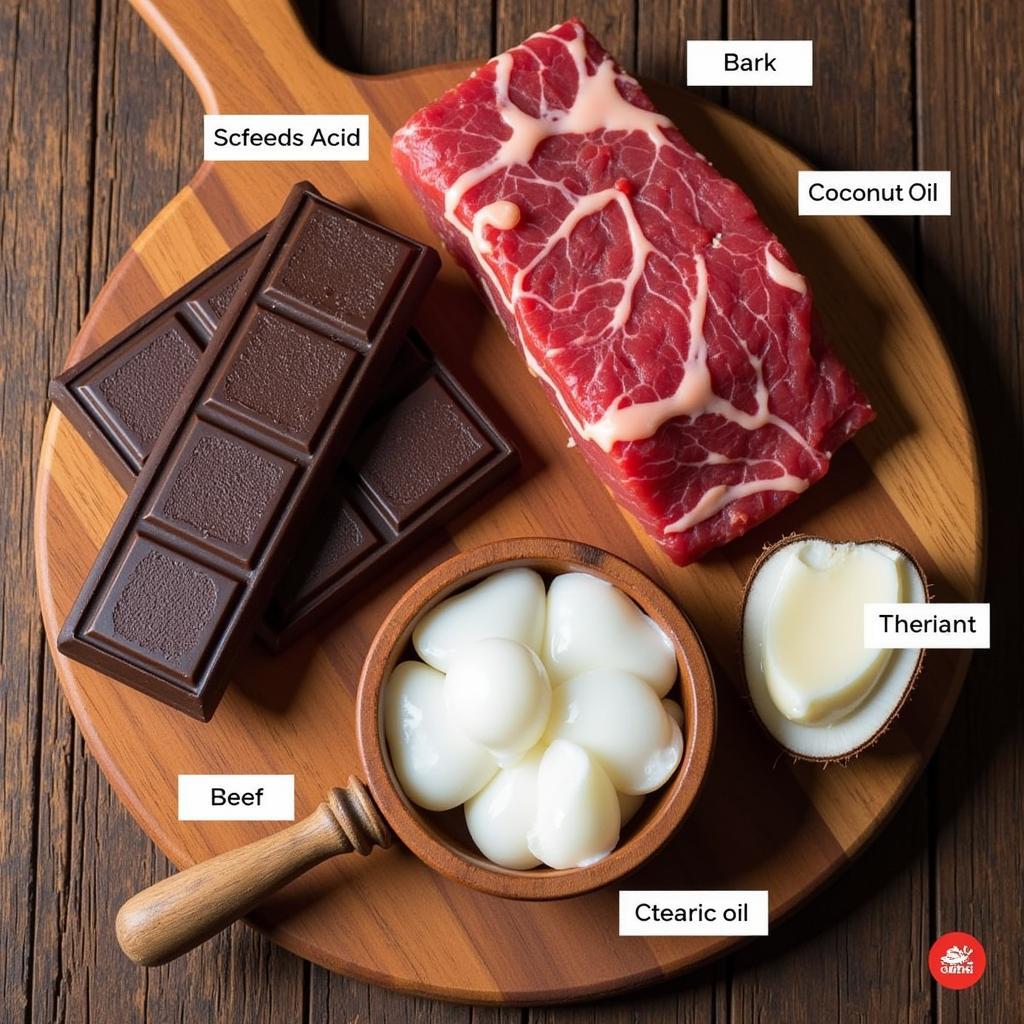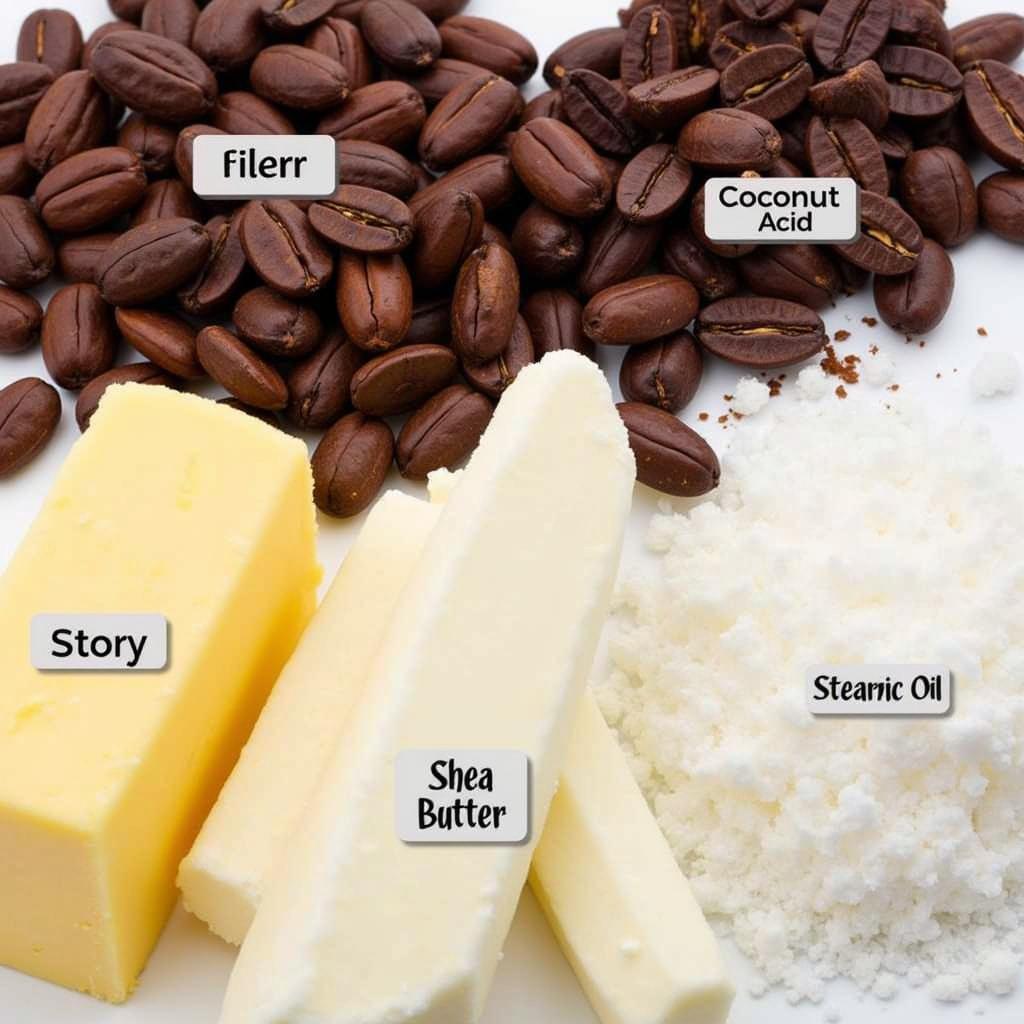Stearic acid, a saturated fatty acid, is a common ingredient in many foods we consume. Understanding its presence in our diet is key to making informed choices. This exploration dives into which foods contain the highest concentrations of stearic acid, examining its potential health impacts and addressing common misconceptions.
Decoding Stearic Acid: What is it and Where Does it Hide?
Stearic acid is a long-chain saturated fatty acid, often found in both animal and plant-based fats. While the term “saturated fat” often raises concerns, stearic acid has a unique characteristic: it’s largely converted to oleic acid, a heart-healthy monounsaturated fat, in the liver. This conversion makes its impact on cholesterol levels quite different from other saturated fats. So, which foods are the richest sources of this intriguing fatty acid? Let’s explore.
 Foods High in Stearic Acid
Foods High in Stearic Acid
The Stearic Acid Superstars: Unveiling the Top Sources
Several foods stand out as significant contributors of stearic acid to our diets. Animal fats, especially those found in beef, lamb, and pork, are particularly rich sources. Within these meats, the fattier cuts tend to contain higher concentrations. Dairy products like butter, cheese, and whole milk also contribute to stearic acid intake, although in lesser amounts compared to red meat.
 Plant-Based Sources of Stearic Acid
Plant-Based Sources of Stearic Acid
Moving to the plant kingdom, certain vegetable fats boast notable stearic acid content. Cocoa butter, a key component of chocolate, is a significant source, meaning dark chocolate (with its higher cocoa butter content) is a better source than milk or white chocolate. Other plant-based sources include shea butter, coconut oil, and palm oil.
Stearic Acid and Your Health: Separating Fact from Fiction
Contrary to popular belief, stearic acid doesn’t significantly raise LDL (“bad”) cholesterol levels. Studies have shown that it might even have a neutral or slightly beneficial effect on cholesterol, potentially due to its conversion to oleic acid. However, it’s important to consider the overall dietary context. Foods high in stearic acid often come with other saturated fats that do raise LDL cholesterol, so moderation and balance are key.
Is Stearic Acid Good for You?
While stearic acid may not be the villain it’s often portrayed as, it’s important to remember that it’s still a saturated fat. A diet excessively high in saturated fats, even if a portion comes from stearic acid, isn’t recommended.
What are the Negative Effects of Stearic Acid?
Though stearic acid’s conversion to oleic acid mitigates some negative impacts, excessive intake can still contribute to overall calorie intake and potentially influence inflammation.
 Balanced Diet with Stearic Acid Foods
Balanced Diet with Stearic Acid Foods
Incorporating Stearic Acid Foods Wisely
Enjoying foods containing stearic acid as part of a balanced diet is key. Opt for lean cuts of meat, choose dark chocolate over milk or white chocolate, and use plant-based oils like coconut oil sparingly. Focus on incorporating a variety of healthy fats into your diet, including monounsaturated and polyunsaturated fats found in olive oil, avocados, and nuts.
Conclusion: Navigating the Stearic Acid Landscape
Understanding the role of stearic acid in our diet allows us to make informed food choices. While not all saturated fats are created equal, moderation and a balanced approach remain crucial for overall health. By understanding which foods contain the most stearic acid, we can enjoy them as part of a healthy and delicious diet.
FAQ:
- What foods are highest in stearic acid? Beef, lamb, and dark chocolate are among the top sources.
- Is stearic acid bad for your heart? Unlike other saturated fats, stearic acid is largely converted to a heart-healthy fat in the liver.
- Should I avoid foods with stearic acid? No, but enjoy them in moderation as part of a balanced diet.
- Are there any plant-based sources of stearic acid? Yes, cocoa butter, shea butter, and coconut oil are good examples.
- How much stearic acid should I consume daily? There’s no specific recommended daily intake for stearic acid.
- Does stearic acid raise cholesterol? Studies suggest it has a minimal effect on LDL cholesterol.
- What are the health benefits of stearic acid? Some research suggests potential anti-inflammatory properties, but more studies are needed.
Need further assistance? Contact us at Phone Number: 02437655121, Email: minacones@gmail.com Or visit our address: 3PGH+8R9, ĐT70A, thôn Trung, Bắc Từ Liêm, Hà Nội, Việt Nam. We have a 24/7 customer service team.